Business Law Assignment - Desklib
VerifiedAdded on 2023/06/04
|9
|2223
|121
AI Summary
This Business Law Assignment covers topics such as Duty of Care, Vicarious Liability, and Contract Law. It discusses relevant cases and their application to the given scenarios. The assignment is well-researched and expertly written, making it a valuable resource for students.
Contribute Materials
Your contribution can guide someone’s learning journey. Share your
documents today.
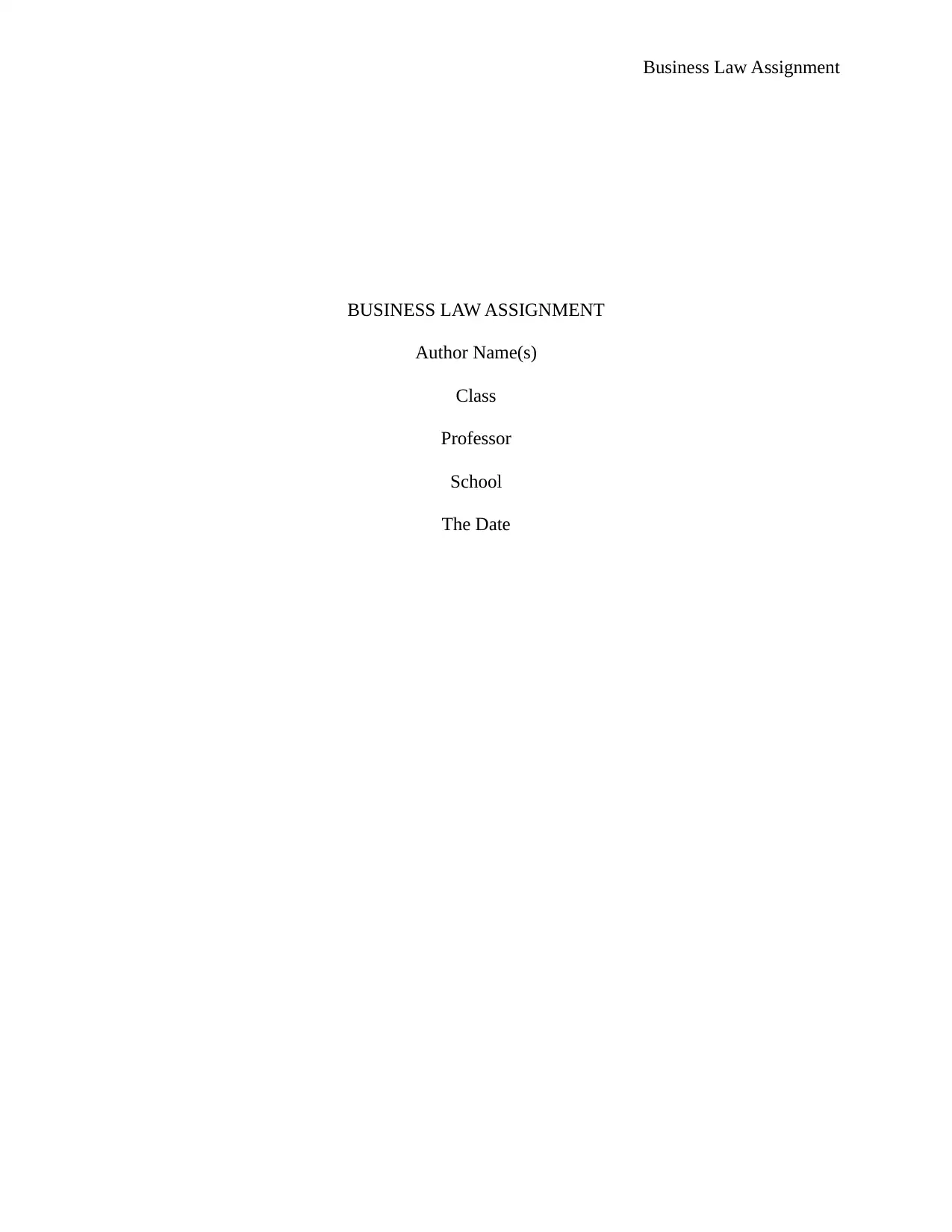
Business Law Assignment
BUSINESS LAW ASSIGNMENT
Author Name(s)
Class
Professor
School
The Date
BUSINESS LAW ASSIGNMENT
Author Name(s)
Class
Professor
School
The Date
Secure Best Marks with AI Grader
Need help grading? Try our AI Grader for instant feedback on your assignments.
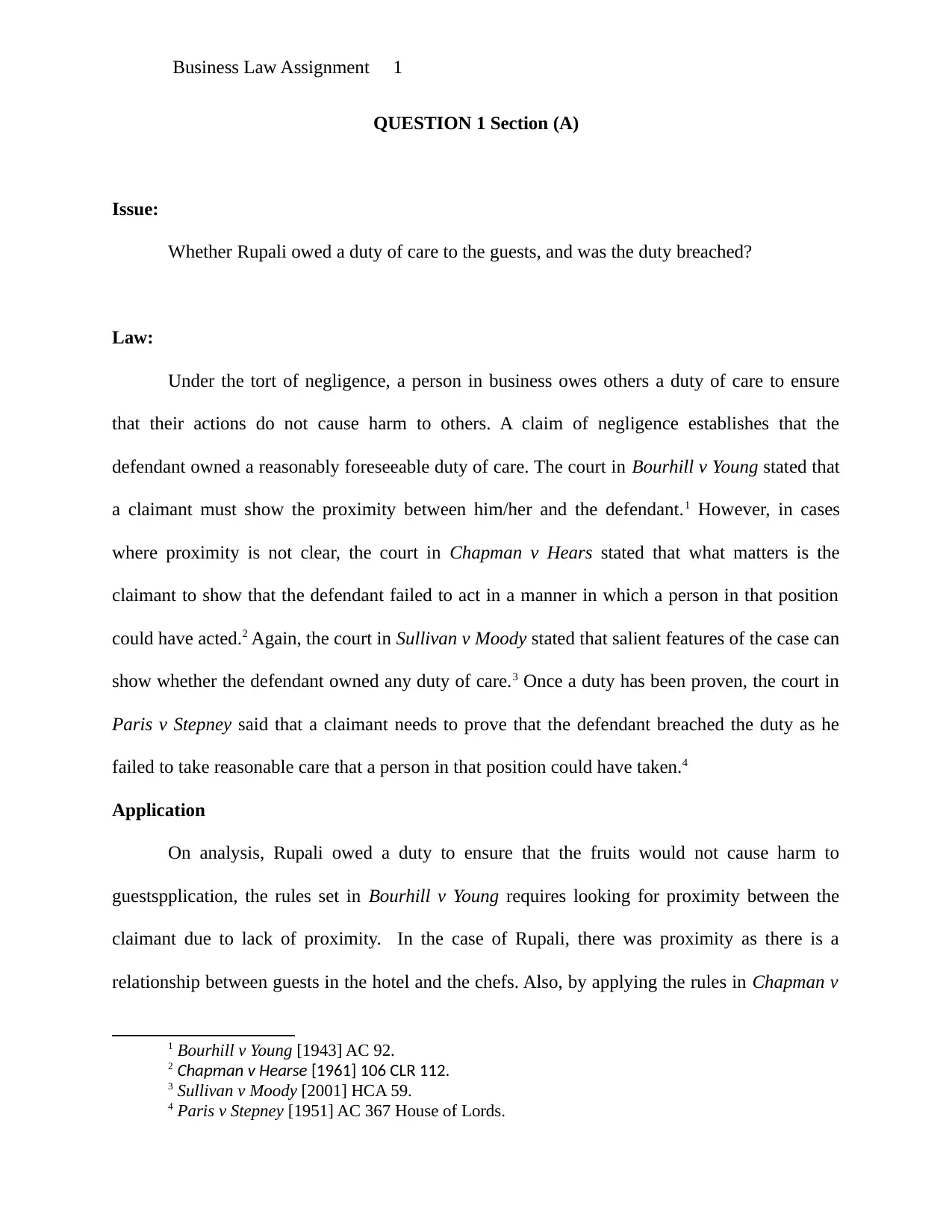
Business Law Assignment 1
QUESTION 1 Section (A)
Issue:
Whether Rupali owed a duty of care to the guests, and was the duty breached?
Law:
Under the tort of negligence, a person in business owes others a duty of care to ensure
that their actions do not cause harm to others. A claim of negligence establishes that the
defendant owned a reasonably foreseeable duty of care. The court in Bourhill v Young stated that
a claimant must show the proximity between him/her and the defendant.1 However, in cases
where proximity is not clear, the court in Chapman v Hears stated that what matters is the
claimant to show that the defendant failed to act in a manner in which a person in that position
could have acted.2 Again, the court in Sullivan v Moody stated that salient features of the case can
show whether the defendant owned any duty of care.3 Once a duty has been proven, the court in
Paris v Stepney said that a claimant needs to prove that the defendant breached the duty as he
failed to take reasonable care that a person in that position could have taken.4
Application
On analysis, Rupali owed a duty to ensure that the fruits would not cause harm to
guestspplication, the rules set in Bourhill v Young requires looking for proximity between the
claimant due to lack of proximity. In the case of Rupali, there was proximity as there is a
relationship between guests in the hotel and the chefs. Also, by applying the rules in Chapman v
1 Bourhill v Young [1943] AC 92.
2 Chapman v Hearse [1961] 106 CLR 112.
3 Sullivan v Moody [2001] HCA 59.
4 Paris v Stepney [1951] AC 367 House of Lords.
QUESTION 1 Section (A)
Issue:
Whether Rupali owed a duty of care to the guests, and was the duty breached?
Law:
Under the tort of negligence, a person in business owes others a duty of care to ensure
that their actions do not cause harm to others. A claim of negligence establishes that the
defendant owned a reasonably foreseeable duty of care. The court in Bourhill v Young stated that
a claimant must show the proximity between him/her and the defendant.1 However, in cases
where proximity is not clear, the court in Chapman v Hears stated that what matters is the
claimant to show that the defendant failed to act in a manner in which a person in that position
could have acted.2 Again, the court in Sullivan v Moody stated that salient features of the case can
show whether the defendant owned any duty of care.3 Once a duty has been proven, the court in
Paris v Stepney said that a claimant needs to prove that the defendant breached the duty as he
failed to take reasonable care that a person in that position could have taken.4
Application
On analysis, Rupali owed a duty to ensure that the fruits would not cause harm to
guestspplication, the rules set in Bourhill v Young requires looking for proximity between the
claimant due to lack of proximity. In the case of Rupali, there was proximity as there is a
relationship between guests in the hotel and the chefs. Also, by applying the rules in Chapman v
1 Bourhill v Young [1943] AC 92.
2 Chapman v Hearse [1961] 106 CLR 112.
3 Sullivan v Moody [2001] HCA 59.
4 Paris v Stepney [1951] AC 367 House of Lords.
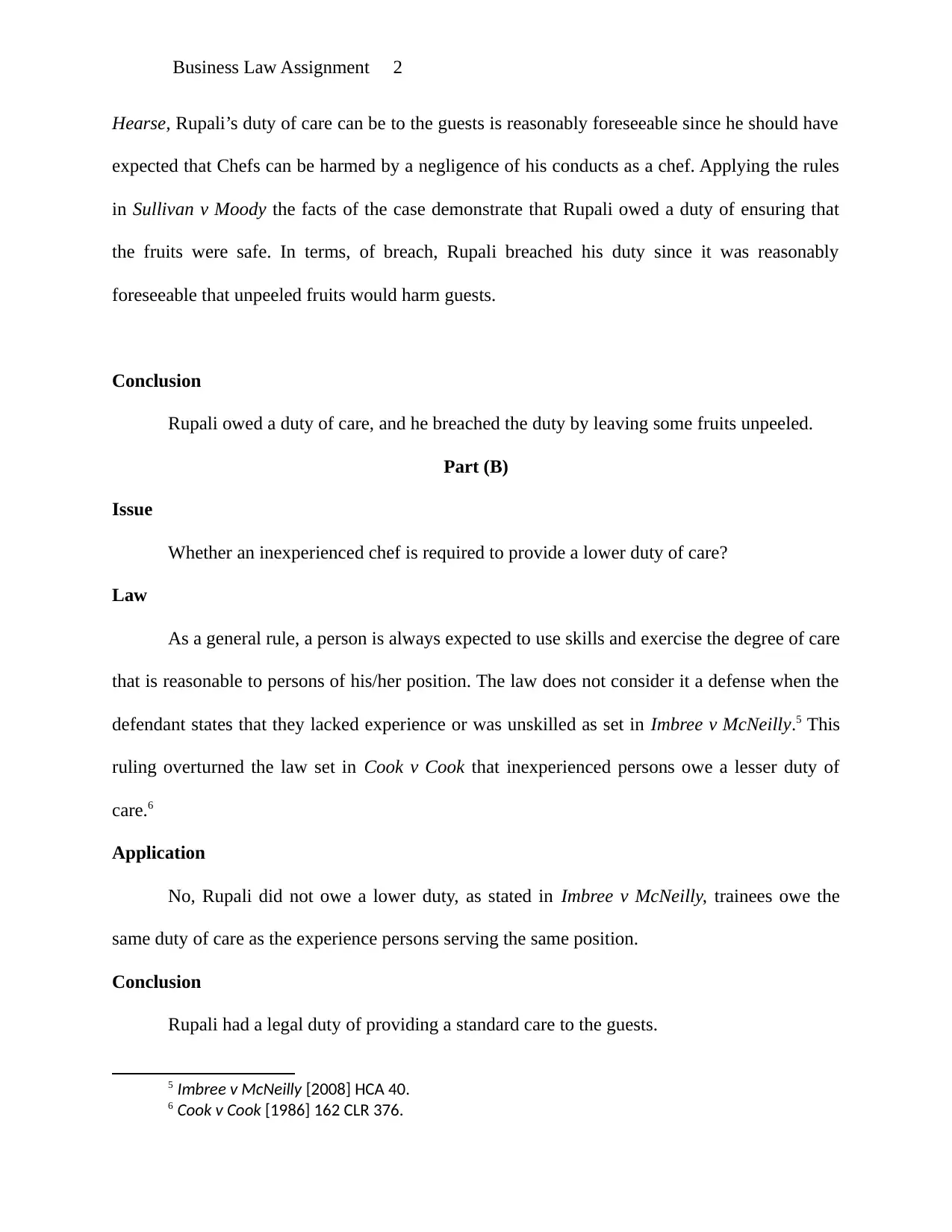
Business Law Assignment 2
Hearse, Rupali’s duty of care can be to the guests is reasonably foreseeable since he should have
expected that Chefs can be harmed by a negligence of his conducts as a chef. Applying the rules
in Sullivan v Moody the facts of the case demonstrate that Rupali owed a duty of ensuring that
the fruits were safe. In terms, of breach, Rupali breached his duty since it was reasonably
foreseeable that unpeeled fruits would harm guests.
Conclusion
Rupali owed a duty of care, and he breached the duty by leaving some fruits unpeeled.
Part (B)
Issue
Whether an inexperienced chef is required to provide a lower duty of care?
Law
As a general rule, a person is always expected to use skills and exercise the degree of care
that is reasonable to persons of his/her position. The law does not consider it a defense when the
defendant states that they lacked experience or was unskilled as set in Imbree v McNeilly.5 This
ruling overturned the law set in Cook v Cook that inexperienced persons owe a lesser duty of
care.6
Application
No, Rupali did not owe a lower duty, as stated in Imbree v McNeilly, trainees owe the
same duty of care as the experience persons serving the same position.
Conclusion
Rupali had a legal duty of providing a standard care to the guests.
5 Imbree v McNeilly [2008] HCA 40.
6 Cook v Cook [1986] 162 CLR 376.
Hearse, Rupali’s duty of care can be to the guests is reasonably foreseeable since he should have
expected that Chefs can be harmed by a negligence of his conducts as a chef. Applying the rules
in Sullivan v Moody the facts of the case demonstrate that Rupali owed a duty of ensuring that
the fruits were safe. In terms, of breach, Rupali breached his duty since it was reasonably
foreseeable that unpeeled fruits would harm guests.
Conclusion
Rupali owed a duty of care, and he breached the duty by leaving some fruits unpeeled.
Part (B)
Issue
Whether an inexperienced chef is required to provide a lower duty of care?
Law
As a general rule, a person is always expected to use skills and exercise the degree of care
that is reasonable to persons of his/her position. The law does not consider it a defense when the
defendant states that they lacked experience or was unskilled as set in Imbree v McNeilly.5 This
ruling overturned the law set in Cook v Cook that inexperienced persons owe a lesser duty of
care.6
Application
No, Rupali did not owe a lower duty, as stated in Imbree v McNeilly, trainees owe the
same duty of care as the experience persons serving the same position.
Conclusion
Rupali had a legal duty of providing a standard care to the guests.
5 Imbree v McNeilly [2008] HCA 40.
6 Cook v Cook [1986] 162 CLR 376.
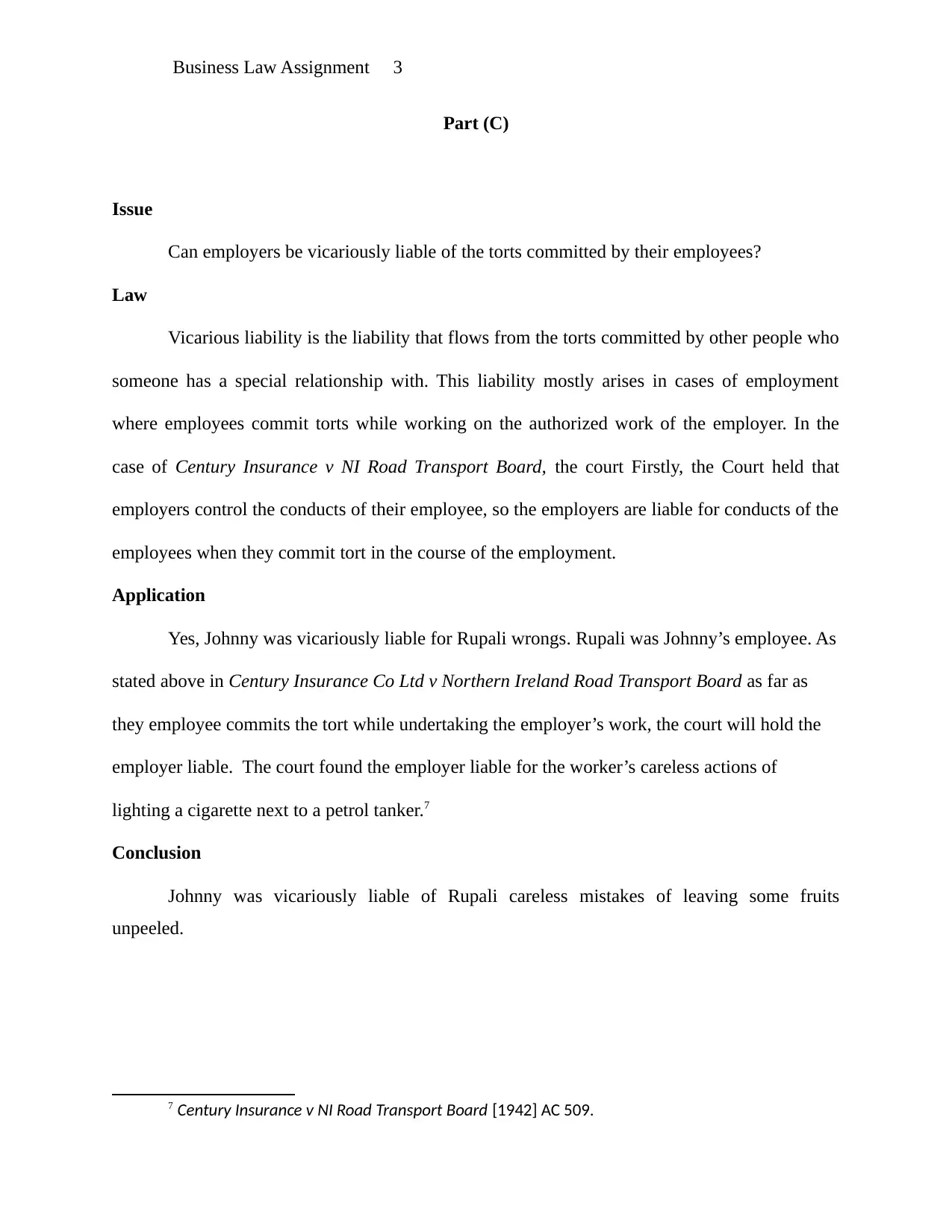
Business Law Assignment 3
Part (C)
Issue
Can employers be vicariously liable of the torts committed by their employees?
Law
Vicarious liability is the liability that flows from the torts committed by other people who
someone has a special relationship with. This liability mostly arises in cases of employment
where employees commit torts while working on the authorized work of the employer. In the
case of Century Insurance v NI Road Transport Board, the court Firstly, the Court held that
employers control the conducts of their employee, so the employers are liable for conducts of the
employees when they commit tort in the course of the employment.
Application
Yes, Johnny was vicariously liable for Rupali wrongs. Rupali was Johnny’s employee. As
stated above in Century Insurance Co Ltd v Northern Ireland Road Transport Board as far as
they employee commits the tort while undertaking the employer’s work, the court will hold the
employer liable. The court found the employer liable for the worker’s careless actions of
lighting a cigarette next to a petrol tanker.7
Conclusion
Johnny was vicariously liable of Rupali careless mistakes of leaving some fruits
unpeeled.
7 Century Insurance v NI Road Transport Board [1942] AC 509.
Part (C)
Issue
Can employers be vicariously liable of the torts committed by their employees?
Law
Vicarious liability is the liability that flows from the torts committed by other people who
someone has a special relationship with. This liability mostly arises in cases of employment
where employees commit torts while working on the authorized work of the employer. In the
case of Century Insurance v NI Road Transport Board, the court Firstly, the Court held that
employers control the conducts of their employee, so the employers are liable for conducts of the
employees when they commit tort in the course of the employment.
Application
Yes, Johnny was vicariously liable for Rupali wrongs. Rupali was Johnny’s employee. As
stated above in Century Insurance Co Ltd v Northern Ireland Road Transport Board as far as
they employee commits the tort while undertaking the employer’s work, the court will hold the
employer liable. The court found the employer liable for the worker’s careless actions of
lighting a cigarette next to a petrol tanker.7
Conclusion
Johnny was vicariously liable of Rupali careless mistakes of leaving some fruits
unpeeled.
7 Century Insurance v NI Road Transport Board [1942] AC 509.
Secure Best Marks with AI Grader
Need help grading? Try our AI Grader for instant feedback on your assignments.
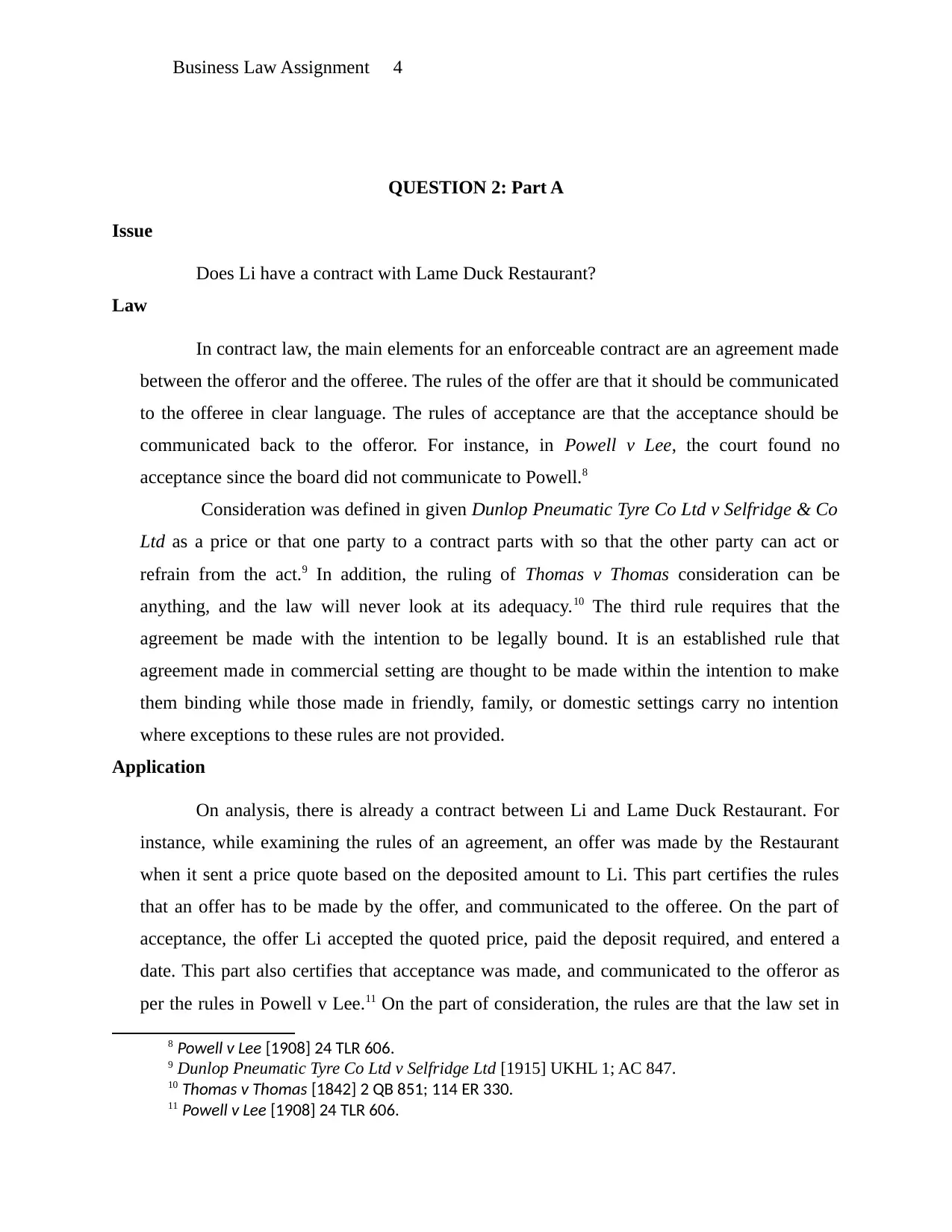
Business Law Assignment 4
QUESTION 2: Part A
Issue
Does Li have a contract with Lame Duck Restaurant?
Law
In contract law, the main elements for an enforceable contract are an agreement made
between the offeror and the offeree. The rules of the offer are that it should be communicated
to the offeree in clear language. The rules of acceptance are that the acceptance should be
communicated back to the offeror. For instance, in Powell v Lee, the court found no
acceptance since the board did not communicate to Powell.8
Consideration was defined in given Dunlop Pneumatic Tyre Co Ltd v Selfridge & Co
Ltd as a price or that one party to a contract parts with so that the other party can act or
refrain from the act.9 In addition, the ruling of Thomas v Thomas consideration can be
anything, and the law will never look at its adequacy.10 The third rule requires that the
agreement be made with the intention to be legally bound. It is an established rule that
agreement made in commercial setting are thought to be made within the intention to make
them binding while those made in friendly, family, or domestic settings carry no intention
where exceptions to these rules are not provided.
Application
On analysis, there is already a contract between Li and Lame Duck Restaurant. For
instance, while examining the rules of an agreement, an offer was made by the Restaurant
when it sent a price quote based on the deposited amount to Li. This part certifies the rules
that an offer has to be made by the offer, and communicated to the offeree. On the part of
acceptance, the offer Li accepted the quoted price, paid the deposit required, and entered a
date. This part also certifies that acceptance was made, and communicated to the offeror as
per the rules in Powell v Lee.11 On the part of consideration, the rules are that the law set in
8 Powell v Lee [1908] 24 TLR 606.
9 Dunlop Pneumatic Tyre Co Ltd v Selfridge Ltd [1915] UKHL 1; AC 847.
10 Thomas v Thomas [1842] 2 QB 851; 114 ER 330.
11 Powell v Lee [1908] 24 TLR 606.
QUESTION 2: Part A
Issue
Does Li have a contract with Lame Duck Restaurant?
Law
In contract law, the main elements for an enforceable contract are an agreement made
between the offeror and the offeree. The rules of the offer are that it should be communicated
to the offeree in clear language. The rules of acceptance are that the acceptance should be
communicated back to the offeror. For instance, in Powell v Lee, the court found no
acceptance since the board did not communicate to Powell.8
Consideration was defined in given Dunlop Pneumatic Tyre Co Ltd v Selfridge & Co
Ltd as a price or that one party to a contract parts with so that the other party can act or
refrain from the act.9 In addition, the ruling of Thomas v Thomas consideration can be
anything, and the law will never look at its adequacy.10 The third rule requires that the
agreement be made with the intention to be legally bound. It is an established rule that
agreement made in commercial setting are thought to be made within the intention to make
them binding while those made in friendly, family, or domestic settings carry no intention
where exceptions to these rules are not provided.
Application
On analysis, there is already a contract between Li and Lame Duck Restaurant. For
instance, while examining the rules of an agreement, an offer was made by the Restaurant
when it sent a price quote based on the deposited amount to Li. This part certifies the rules
that an offer has to be made by the offer, and communicated to the offeree. On the part of
acceptance, the offer Li accepted the quoted price, paid the deposit required, and entered a
date. This part also certifies that acceptance was made, and communicated to the offeror as
per the rules in Powell v Lee.11 On the part of consideration, the rules are that the law set in
8 Powell v Lee [1908] 24 TLR 606.
9 Dunlop Pneumatic Tyre Co Ltd v Selfridge Ltd [1915] UKHL 1; AC 847.
10 Thomas v Thomas [1842] 2 QB 851; 114 ER 330.
11 Powell v Lee [1908] 24 TLR 606.
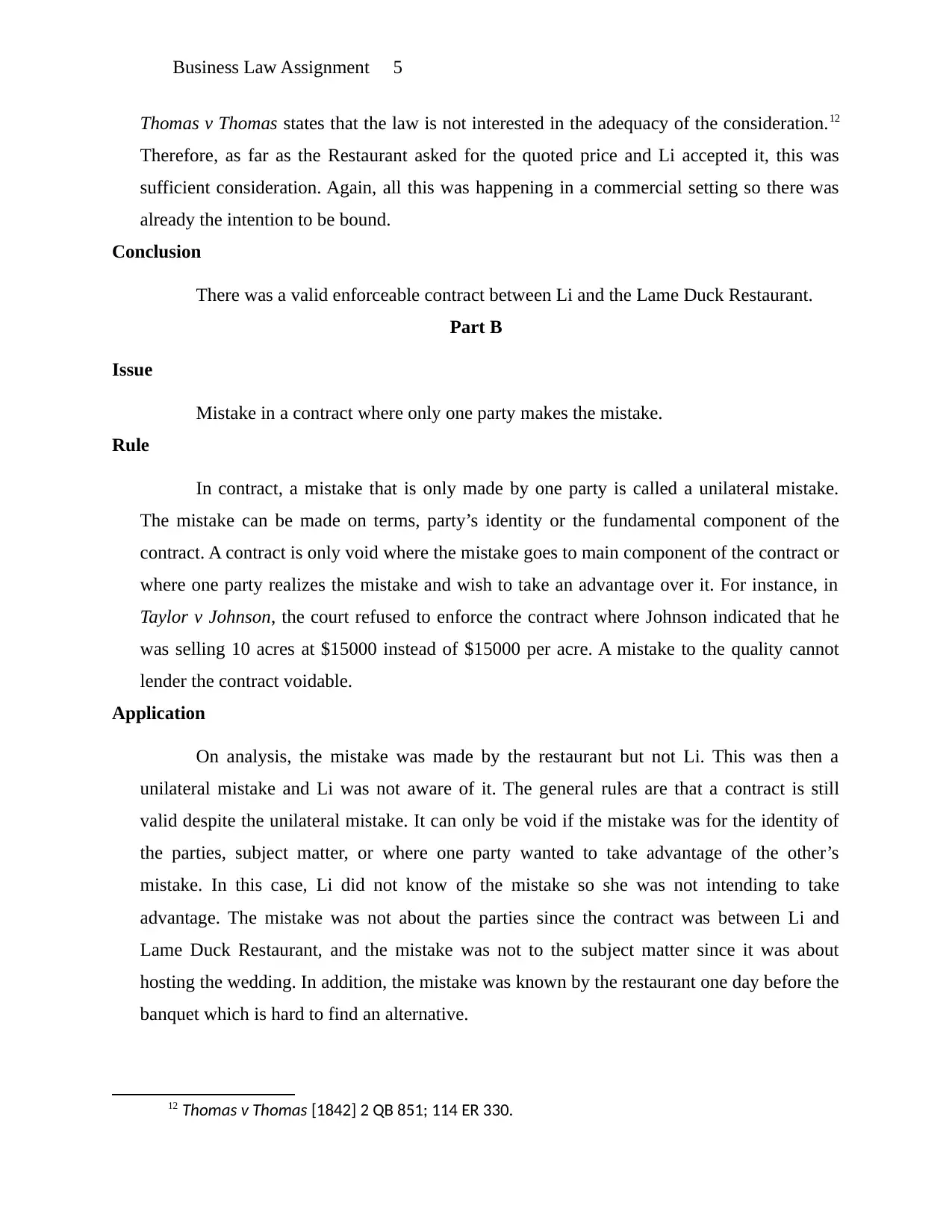
Business Law Assignment 5
Thomas v Thomas states that the law is not interested in the adequacy of the consideration.12
Therefore, as far as the Restaurant asked for the quoted price and Li accepted it, this was
sufficient consideration. Again, all this was happening in a commercial setting so there was
already the intention to be bound.
Conclusion
There was a valid enforceable contract between Li and the Lame Duck Restaurant.
Part B
Issue
Mistake in a contract where only one party makes the mistake.
Rule
In contract, a mistake that is only made by one party is called a unilateral mistake.
The mistake can be made on terms, party’s identity or the fundamental component of the
contract. A contract is only void where the mistake goes to main component of the contract or
where one party realizes the mistake and wish to take an advantage over it. For instance, in
Taylor v Johnson, the court refused to enforce the contract where Johnson indicated that he
was selling 10 acres at $15000 instead of $15000 per acre. A mistake to the quality cannot
lender the contract voidable.
Application
On analysis, the mistake was made by the restaurant but not Li. This was then a
unilateral mistake and Li was not aware of it. The general rules are that a contract is still
valid despite the unilateral mistake. It can only be void if the mistake was for the identity of
the parties, subject matter, or where one party wanted to take advantage of the other’s
mistake. In this case, Li did not know of the mistake so she was not intending to take
advantage. The mistake was not about the parties since the contract was between Li and
Lame Duck Restaurant, and the mistake was not to the subject matter since it was about
hosting the wedding. In addition, the mistake was known by the restaurant one day before the
banquet which is hard to find an alternative.
12 Thomas v Thomas [1842] 2 QB 851; 114 ER 330.
Thomas v Thomas states that the law is not interested in the adequacy of the consideration.12
Therefore, as far as the Restaurant asked for the quoted price and Li accepted it, this was
sufficient consideration. Again, all this was happening in a commercial setting so there was
already the intention to be bound.
Conclusion
There was a valid enforceable contract between Li and the Lame Duck Restaurant.
Part B
Issue
Mistake in a contract where only one party makes the mistake.
Rule
In contract, a mistake that is only made by one party is called a unilateral mistake.
The mistake can be made on terms, party’s identity or the fundamental component of the
contract. A contract is only void where the mistake goes to main component of the contract or
where one party realizes the mistake and wish to take an advantage over it. For instance, in
Taylor v Johnson, the court refused to enforce the contract where Johnson indicated that he
was selling 10 acres at $15000 instead of $15000 per acre. A mistake to the quality cannot
lender the contract voidable.
Application
On analysis, the mistake was made by the restaurant but not Li. This was then a
unilateral mistake and Li was not aware of it. The general rules are that a contract is still
valid despite the unilateral mistake. It can only be void if the mistake was for the identity of
the parties, subject matter, or where one party wanted to take advantage of the other’s
mistake. In this case, Li did not know of the mistake so she was not intending to take
advantage. The mistake was not about the parties since the contract was between Li and
Lame Duck Restaurant, and the mistake was not to the subject matter since it was about
hosting the wedding. In addition, the mistake was known by the restaurant one day before the
banquet which is hard to find an alternative.
12 Thomas v Thomas [1842] 2 QB 851; 114 ER 330.
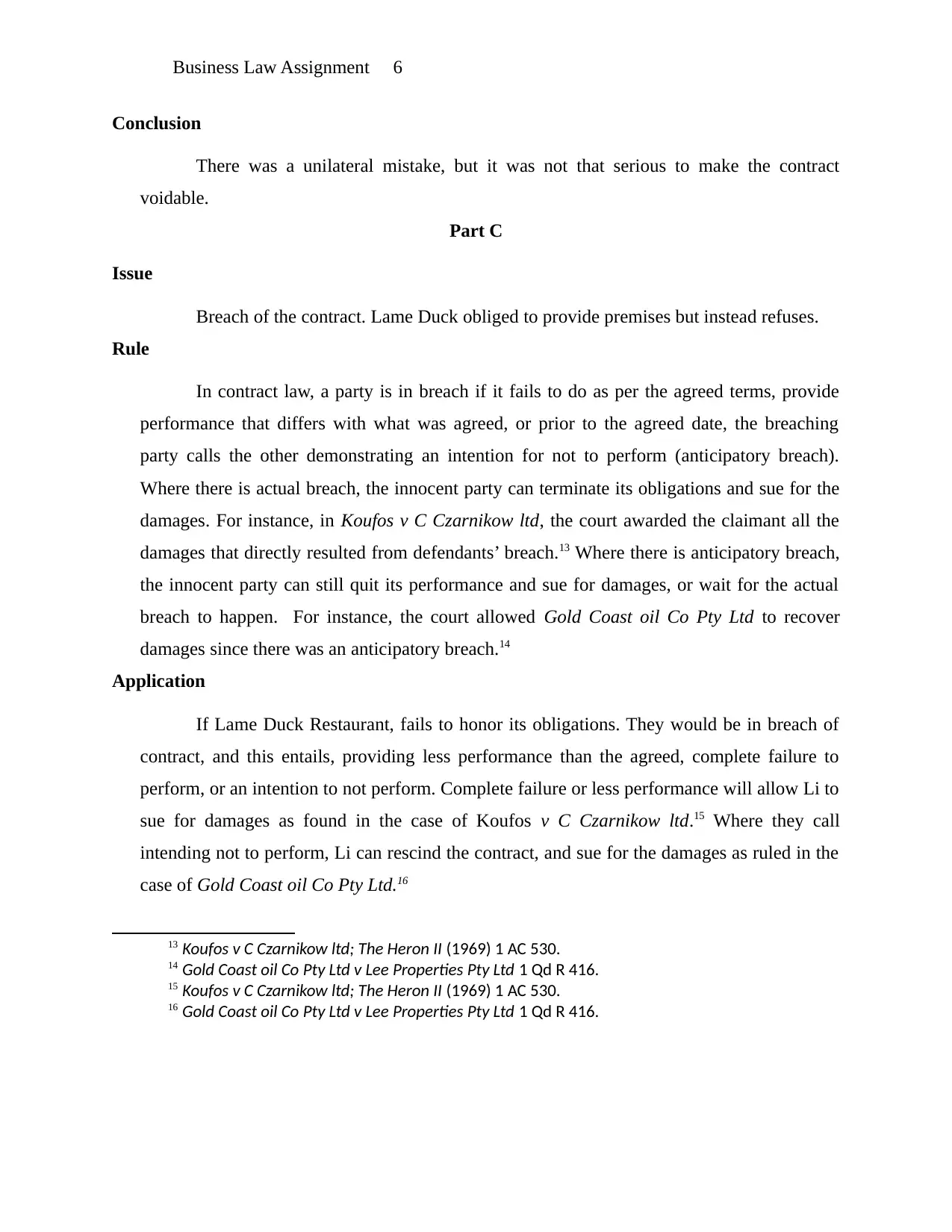
Business Law Assignment 6
Conclusion
There was a unilateral mistake, but it was not that serious to make the contract
voidable.
Part C
Issue
Breach of the contract. Lame Duck obliged to provide premises but instead refuses.
Rule
In contract law, a party is in breach if it fails to do as per the agreed terms, provide
performance that differs with what was agreed, or prior to the agreed date, the breaching
party calls the other demonstrating an intention for not to perform (anticipatory breach).
Where there is actual breach, the innocent party can terminate its obligations and sue for the
damages. For instance, in Koufos v C Czarnikow ltd, the court awarded the claimant all the
damages that directly resulted from defendants’ breach.13 Where there is anticipatory breach,
the innocent party can still quit its performance and sue for damages, or wait for the actual
breach to happen. For instance, the court allowed Gold Coast oil Co Pty Ltd to recover
damages since there was an anticipatory breach.14
Application
If Lame Duck Restaurant, fails to honor its obligations. They would be in breach of
contract, and this entails, providing less performance than the agreed, complete failure to
perform, or an intention to not perform. Complete failure or less performance will allow Li to
sue for damages as found in the case of Koufos v C Czarnikow ltd.15 Where they call
intending not to perform, Li can rescind the contract, and sue for the damages as ruled in the
case of Gold Coast oil Co Pty Ltd.16
13 Koufos v C Czarnikow ltd; The Heron II (1969) 1 AC 530.
14 Gold Coast oil Co Pty Ltd v Lee Properties Pty Ltd 1 Qd R 416.
15 Koufos v C Czarnikow ltd; The Heron II (1969) 1 AC 530.
16 Gold Coast oil Co Pty Ltd v Lee Properties Pty Ltd 1 Qd R 416.
Conclusion
There was a unilateral mistake, but it was not that serious to make the contract
voidable.
Part C
Issue
Breach of the contract. Lame Duck obliged to provide premises but instead refuses.
Rule
In contract law, a party is in breach if it fails to do as per the agreed terms, provide
performance that differs with what was agreed, or prior to the agreed date, the breaching
party calls the other demonstrating an intention for not to perform (anticipatory breach).
Where there is actual breach, the innocent party can terminate its obligations and sue for the
damages. For instance, in Koufos v C Czarnikow ltd, the court awarded the claimant all the
damages that directly resulted from defendants’ breach.13 Where there is anticipatory breach,
the innocent party can still quit its performance and sue for damages, or wait for the actual
breach to happen. For instance, the court allowed Gold Coast oil Co Pty Ltd to recover
damages since there was an anticipatory breach.14
Application
If Lame Duck Restaurant, fails to honor its obligations. They would be in breach of
contract, and this entails, providing less performance than the agreed, complete failure to
perform, or an intention to not perform. Complete failure or less performance will allow Li to
sue for damages as found in the case of Koufos v C Czarnikow ltd.15 Where they call
intending not to perform, Li can rescind the contract, and sue for the damages as ruled in the
case of Gold Coast oil Co Pty Ltd.16
13 Koufos v C Czarnikow ltd; The Heron II (1969) 1 AC 530.
14 Gold Coast oil Co Pty Ltd v Lee Properties Pty Ltd 1 Qd R 416.
15 Koufos v C Czarnikow ltd; The Heron II (1969) 1 AC 530.
16 Gold Coast oil Co Pty Ltd v Lee Properties Pty Ltd 1 Qd R 416.
Paraphrase This Document
Need a fresh take? Get an instant paraphrase of this document with our AI Paraphraser
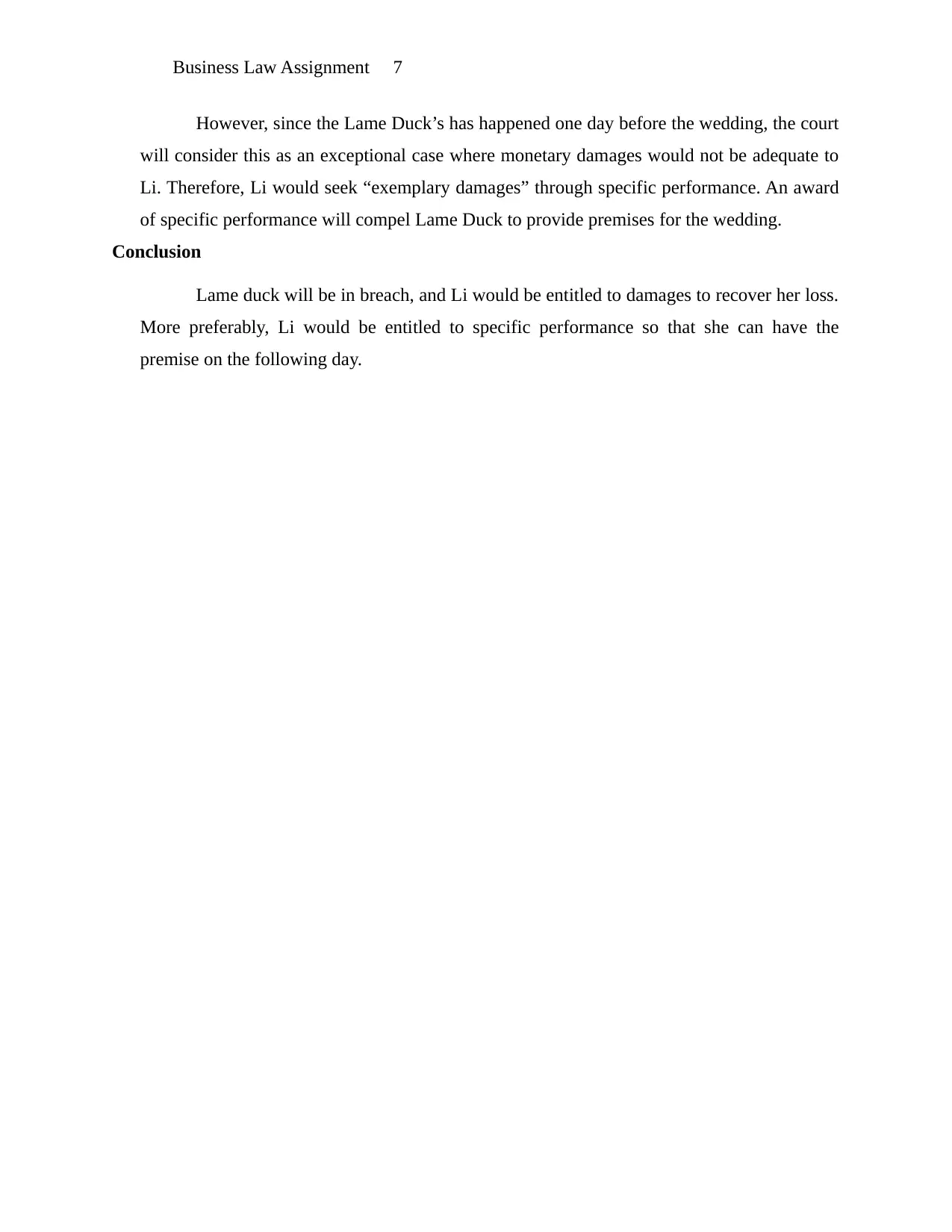
Business Law Assignment 7
However, since the Lame Duck’s has happened one day before the wedding, the court
will consider this as an exceptional case where monetary damages would not be adequate to
Li. Therefore, Li would seek “exemplary damages” through specific performance. An award
of specific performance will compel Lame Duck to provide premises for the wedding.
Conclusion
Lame duck will be in breach, and Li would be entitled to damages to recover her loss.
More preferably, Li would be entitled to specific performance so that she can have the
premise on the following day.
However, since the Lame Duck’s has happened one day before the wedding, the court
will consider this as an exceptional case where monetary damages would not be adequate to
Li. Therefore, Li would seek “exemplary damages” through specific performance. An award
of specific performance will compel Lame Duck to provide premises for the wedding.
Conclusion
Lame duck will be in breach, and Li would be entitled to damages to recover her loss.
More preferably, Li would be entitled to specific performance so that she can have the
premise on the following day.
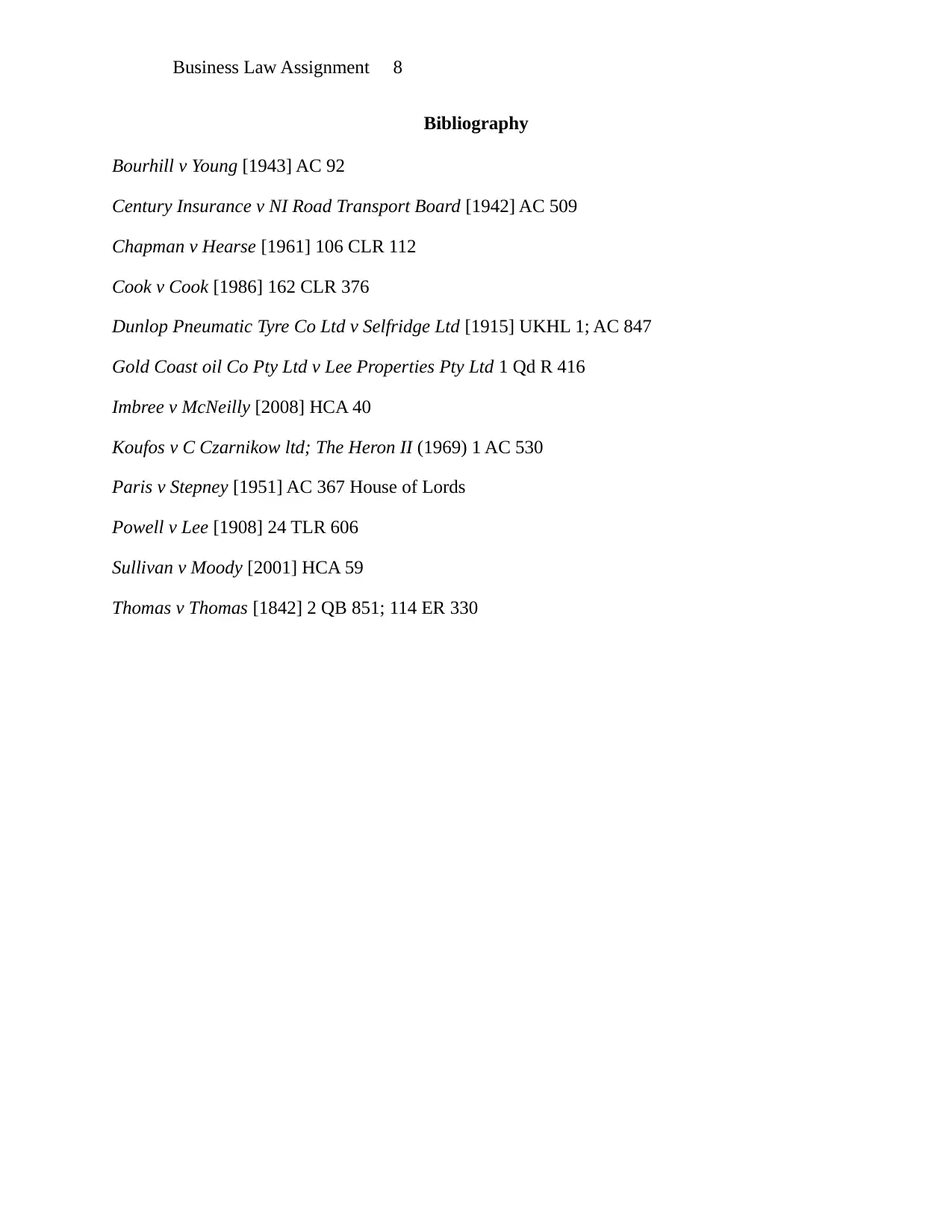
Business Law Assignment 8
Bibliography
Bourhill v Young [1943] AC 92
Century Insurance v NI Road Transport Board [1942] AC 509
Chapman v Hearse [1961] 106 CLR 112
Cook v Cook [1986] 162 CLR 376
Dunlop Pneumatic Tyre Co Ltd v Selfridge Ltd [1915] UKHL 1; AC 847
Gold Coast oil Co Pty Ltd v Lee Properties Pty Ltd 1 Qd R 416
Imbree v McNeilly [2008] HCA 40
Koufos v C Czarnikow ltd; The Heron II (1969) 1 AC 530
Paris v Stepney [1951] AC 367 House of Lords
Powell v Lee [1908] 24 TLR 606
Sullivan v Moody [2001] HCA 59
Thomas v Thomas [1842] 2 QB 851; 114 ER 330
Bibliography
Bourhill v Young [1943] AC 92
Century Insurance v NI Road Transport Board [1942] AC 509
Chapman v Hearse [1961] 106 CLR 112
Cook v Cook [1986] 162 CLR 376
Dunlop Pneumatic Tyre Co Ltd v Selfridge Ltd [1915] UKHL 1; AC 847
Gold Coast oil Co Pty Ltd v Lee Properties Pty Ltd 1 Qd R 416
Imbree v McNeilly [2008] HCA 40
Koufos v C Czarnikow ltd; The Heron II (1969) 1 AC 530
Paris v Stepney [1951] AC 367 House of Lords
Powell v Lee [1908] 24 TLR 606
Sullivan v Moody [2001] HCA 59
Thomas v Thomas [1842] 2 QB 851; 114 ER 330
1 out of 9
Related Documents
Your All-in-One AI-Powered Toolkit for Academic Success.
+13062052269
info@desklib.com
Available 24*7 on WhatsApp / Email
![[object Object]](/_next/static/media/star-bottom.7253800d.svg)
Unlock your academic potential
© 2024 | Zucol Services PVT LTD | All rights reserved.

